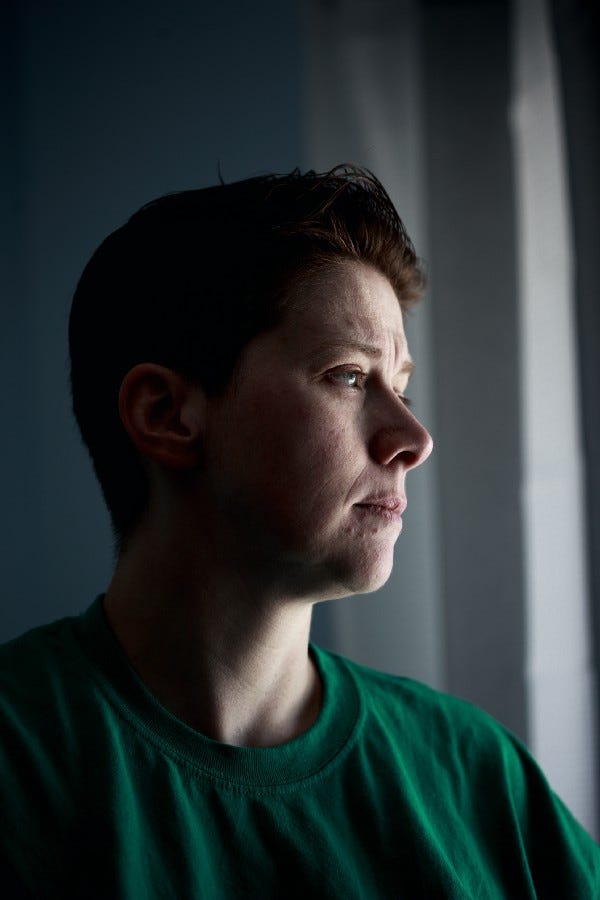I Don’t “Pass” and I Don’t Want To
As a trans person, how I look shouldn’t determine whether I’m treated with respect
As a trans person, how I look shouldn’t determine whether I’m treated with respect

I’m 5'6'’. Not tiny by any means, but in most people’s eyes, that’s short for a “guy”. I have a chest that, the last time I measured it, was a DD cup size. I have big eyes and shrimpy little arms and the distance between my nose and my lips is very small. These are apparently all things that signal “femaleness” to the average eye.
I downloaded the “girls only” social media app Giggle recently, to try out its much talked-about gender identifying facial scan. Only women are allowed to use this app to make new friends, go on dates, and organize book clubs, and the app tries to ensure that by requiring users have sufficiently feminine faces. I was disappointed when Giggle quickly labeled me as a girl and cheerily welcomed me into its platform. Disappointed but not surprised. I know that I am algorithmically feminine.
I’m a nonbinary trans male, meaning I identify a little bit as a man, and a little bit as a beautiful genderless forest nymph. That description is both a joke and is serious. I’ve been out as trans since mid-2016. For years I’ve dressed and styled myself in a pretty androgynous way. I’ve taken low-dose hormones since May 2018, and have had an “M” on my driver’s license since October of that same year. I’ve checked off many of the boxes that make transness seem “real” and legitimate to the outside world, in other words.
In coffee shops and restaurants and walking down the street, strangers routinely call me “she” and “ma’am”. They likely always will. Sometimes when I use the men’s restroom I can feel mild surprise or discomfort radiating off a guy standing near me. If I want someone to fully grok who and what I am, I have to find the courage to tell them. I know what I’m working with. I know why the Giggle app made the conclusion it did. I don’t like it, but I am very aware of all of it.
I’m a trans person, and I don’t “pass” as cisgender. I’m not even really trying to. I think it’s a foolhardy and self-defeating goal. I don’t believe cisgender people are the foundation for what defines a woman or a man. They certainly have no ability to define what a nonbinary person is. I have no interest in emulating them or playing by their rules.
My hips are wide, my chest is big, my eyes are saucers, and I’m a guy-adjacent-elf-person-thing anyway. If cisgender people find that confusing or difficult to deal with, they are the ones who will have to change. Not me.
I don’t pass. I don’t want to. I just want to be treated with respect.
…
The trans world is obsessed with passing. It seems that everybody wants to know whether they look cis, whether they have hidden their transness away and performed gender in a perfectly tidy, digestible way that will force the outside world to finally acknowledge them. They believe that if they alter themselves enough, they will finally earn the right to be called the correct name, addressed with the right pronouns, granted access to the gendered spaces that ought to have always been theirs.
This is particularly true of online spaces that supposedly exist to help isolated trans people find resources and community. In these spaces, the “passing” posts are sadly relentless. Dozens and dozens of selfies every day; a cute guy with a phone in his hand; a gorgeous girl with a nose ring and a long side sweep of hair; an enby with a mullet in rainbow hues. They’re each looking down at their phones, their eyes focused, but soft. Contemplative. Unsure.
They’ve looked at themselves so many times, from so many angles, that their self-image has stopped making sense. Like a word repeated too many times, the small elements no longer cohere to a whole. They need an outside perspective to test their reality. But reality itself is also distorted — distorted by sexism, transphobia, hatred of the effeminate, the butch, and most of all the transfeminine. They have no idea what to make of the face in the mirror. What society will make of that face.
They want to know whether it’s safe to go out, to wear the dress, to use the bathroom they want to use, to ask a coworker to use their correct name. And that all relies, they think, on whether they look enough like a cisgender person.
“Just got a new haircut,” a caption reads, “do I pass?”
“Does this shirt help me look flat-chested?” wonders another.
A woman asks, “Which facial feminization surgeries would I need to get in order to be read as female?”
“Three people called me ‘he’ today,” says a nonbinary person. “But two people called me “she”! I keep track in a spreadsheet every day.”
One trans man tells another, “You’re never going to pass if you keep wearing makeup.”
Over and over they talk about these concerns. They talk about it on Reddit and Facebook and Tumblr. They talk about it in private messages and via text. They talk about it on their Youtube channels. They talk about it with their irl trans friends. They ask themselves these questions every day when they get ready for work or school. Do I pass? Do I look like one of them now now? How do other people see me? Will cis people accept me? What can I do to make them ‘get’ who I am?
I don’t blame any of them for thinking this way. They have a ton of rational reasons for it. I just wish I could free them from all this insecurity. Wish I could convince them that they don’t have to change a thing. If I could, I would take all their anxieties and transfer all of it to cisgender people, make them fret and fixate on whether they are treating trans people well enough. Instead of us trans folks having to question ourselves relentlessly, I’d like to see cis people ask themselves deeper questions about their actions, their baseless assumptions, the harm that they do.
…
When trans people focus on “passing”, we take an external problem — the massive and inescapable transphobia of our world— and put the responsibility for ending it on our haircuts. And our jawlines. And how long we’ve been on E or T. We’re hoping that if we take the exact correct steps, and conform to cis standards of beauty and handsomeness with precision and devotion, that people will finally stop erasing who we are, treating us with disrespect, and making us feel unwelcome and unsafe.
The sad truth, which is also a freeing one, is that transphobia cannot be ended by wearing the correct shirt, upping the hormone dose, packing or tucking or padding or pitching one’s voice. We may take all kinds of steps to modulate who we are, but we cannot fully control the impression we make on other people.
Cis people don’t misgender us because we fail to “pass”. They misgender us because they’ve been trained to relentlessly assume the gender of people based on how they look. Cis people don’t throw us out of bathrooms, locker rooms, and other gender-segregated spaces because we didn’t try hard enough to “pass” as our gender. They exclude us because they believe they have the ability to define who is a woman or a man. Cis people don’t erase us, exclude us, harass us, and kill the most vulnerable among us because we failed to look like one of them. They do these horrific things because they see us as less than human.
…

Trying to look cis is never going to save us. Sure, attempts at passing might let a few trans people slip through society’s cracks, disappearing into the binary world and accepting a bit of the ease and privilege that cisgender men and women enjoy. But for the vast majority of us, passing as cis was never going to be possible. Many of us are too tall or too short or too broad in the shoulders or the hips.
What do I even mean by “too tall”? What makes someone’s hips “too” broad? The only reason trans people’s features seem incompatible with our identities is because the cisgender world has taught us to see our bodies that way. In truth, there is no such thing as being too tall to be a woman, or too hippy to be a man. These traits only invalidate our identities if we continue to believe that cisgender people set the standard.
An obsession with passing makes gender dysphoria worse. If I believe that I must have sufficiently narrow hips in order to be taken seriously as a man, I have to fixate on the shape of my body. I might believe I have take steps to lose weight, to shave fat and muscle off of my hip bones. I might even keep relentless track of my progress. Eventually I’ll get so lost in the mire of self-reflection and self-hate that I’ll need to run to a subreddit or Facebook group to share my most recent pics and ask if I’m headed in the right direction, if my hips are getting more narrow, if I “pass”.
I used to do pretty much all of that. It didn’t go well for me. I didn’t eat and I over-exercised and I developed a heart murmur. At the end of it I still had wide hips.
If I care about passing, then I have to care about the width of my hips. But if I believe that male people can have any kind of body shape, and that I am a male-ish person innately, right now… then I can relax a little bit. I don’t have to obsess over it. I don’t have to be at war with my bones.
…

I can spend my time contorting my body and altering my appearance in hope that it will eventually coax strangers and colleagues into using the right words for me, or I can just cut to the chase and tell people what my pronouns are. I can pine for a day when people effortlessly read me as something other than female, or I can correct people whenever they get it wrong. I can try to reshape myself to meet society’s expectations, or I can change people’s expectations by proudly existing as myself.
Because I am nonbinary, my transition never had the option of being a passive process. I have to educate people and advocate for myself if I want to be treated correctly. There is no such thing as “passing” as nonbinary. Most people still are unaware that nonbinary people exist. There is no standard image in the public consciousness of how a nonbinary person looks. If I want someone to call me “they”, I have to ask for it. And explain it. And correct them when they continue to get it wrong. Which happens a lot.
I can’t do all of this alone. My individual choices have an impact on the people around me, but I can’t undo centuries of cissexism. I can, however, band together with my trans siblings, and work to be as visible, and proud, and defiant as possible. I can amplify the voices of trans people who have a lot less power than me. I can correct misgendering and thoughtless gender stereotyping as often as possible. I can refuse to hide. I can help other trans people to live in public as themselves, too.
The only real solution to transphobia is massive, large-scale social change. Cis people need to be educated about trans identities. They need to be taught to use inclusive language and to stop assuming someone’s identity based on their appearance. The world’s gender spaces need to be open to people regardless of how they look. We all need to be reminded, on a regular basis, that nonbinary people and women and men come in all manner of shapes.
The world needs to become fundamentally more accessible to trans people than it is. Cis people need to become fundamentally less bigoted and gender policing than they are. That is what must change. Trans people don’t need to waste our energy trying to “pass” as cisgender. Instead, cis people need to expend great reserves of energy learning how to pass as decent human beings.



